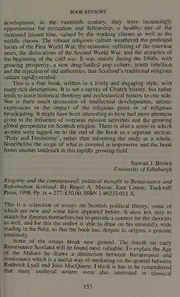
Review of Mason; Kingship and Commonweal: political thought in Renaissance and Reformation Scotland PDF
Preview Review of Mason; Kingship and Commonweal: political thought in Renaissance and Reformation Scotland
BOOK REVIEWS development; in the twentieth century, they were increasingly opportunities for recreation and fellowship, a healthy use ol the increased leisure time, valued by the working classes as well as the middle classes. The vibrant religious culture weathered the profound losses of the First World War, the economic suffering of the interwar years, the dislocations of the Second World War, and the anxieties of the beginning of the cold war. It was mainly during the 1960s, with growing prosperity, a new drug-fuelled pop culture, youth rebellion and the rejection of old authorities, that Scotland’s traditional religious culture rapidly eroded. This is a fine book, written in a lively and engaging style, with many rich descriptions. It is not a survey of Church history, but rather tends to leave historical theology and ecclesiastical history to one side. Nor is there much discussion of intellectual developments, artistic expressions or the impact of the religious press or of religious broadcasting. It might have been interesting to have had more attention given to the influence of overseas mission activities and the growing global perspective on Scottish religion. There is also a sense in which women were tagged on to the end of the book in a separate section, “Piety and Femininity”, rather than informing the study as a whole. Nonetheless the scope of what is covered is impressive and the book forms another landmark in this rapidly growing field. Stewart J. Brown University ofEdinburgh Kingship and the commonweal: political thought in Renaissance and Reformation Scotland. By Roger A. Mason. East Linton: Tuckwell Press, 1998. Pp. ix + 277. £30.00. ISBN 86232 01 X. 1 1 This is a collection of essays on Scottish political theory, some of which are new and some have appeared before. It aims not only to sketch the theories themselves but to provide a context for the theorists as well, and tor this the author is able to draw on his unusually wide reading in the field, so that the book has, despite its origins, a genuine continuity. Some of the essays break new ground. The fourth on early Renaissance Scotland will be found most valuable. To explain the Age of the Makars he draws a distinction between Renaissance and renaissance which is a useful way of mediating on the quarrel between Roderick Lyall and John MacQueen: I think it has to be remembered that many medieval writers were also interested in classical 153 BOOK REVIEWS scholarship, though in the late middle ages there were those like Mair who had their Renaissance moments. One is surprised at the absence of Archbishop Schevez, in view of his interest in Roman authors, from the roll-call. Sir John Ross of Montgrenan, whose title to the qualification King’s Advocate seems thin, should be replaced by the first King’s Advocate in ordinary who was James Henryson of Fordell. Some reference to Mair’s theological works would strengthened the case for John Mair. The essays on Buchanan pursue his relationship to James VI in a very suggestive manner. One feels that a context for Buchanan’s theory may well go back some further years beyond 1567 to the days of More and Thomas Starkey, and to Robertus Britanna and Nicolas de Grouchy in France. Buchanan’s index to a tyrant is his/her sexual excess; More was perhaps nearer the point when he categorised tyrants as men of arrogance, as his Epigrams make clear. An up-to- date edition of Buchanan’s published and unpublished verse (now apparently envisaged) would hopefully provide an additional source for the story of his development. Mason has much of interest to say of Knox, maintaining that he was in fact no radical. He discusses the famous Bullinger reply to Knox’s theses, but curiously omits the correspondents of Calvin like Cecil, worried about his views and Calvin’s remark that “I've sufficiently pointed out that I’m not pleased at the publication of such paradoxes”. Calvini Opera (Corpus Reformatorum series), xvii, 490- ( 491,497.) One must congratulate Dr Mason on his valiant efforts to provide a context for these Scottish theorists, as well as for his meticulous and judicious approach. It is a book no student of the period can neglect. John Durkan University ofGlasgow A Land Afflicted: Scotland and the Covenanter Wars, 1638-1690. By Raymond Campbell Paterson. Edinburgh: John Donald, 1998. Pp. xx + 308. £12.95. ISBN 0 85976 486 9. Raymond C. Paterson completes a trilogy with the publication of A Land Afflicted. As with his earlier work, his particular interest lies in giving an account of battles. Maps and lengthened descriptions of the various fixed conflicts therefore dominate this account of Scottish history between 1638 and 1690. With a useful long chronological range, it is a book aimed at the general reader, without footnotes. This 154
